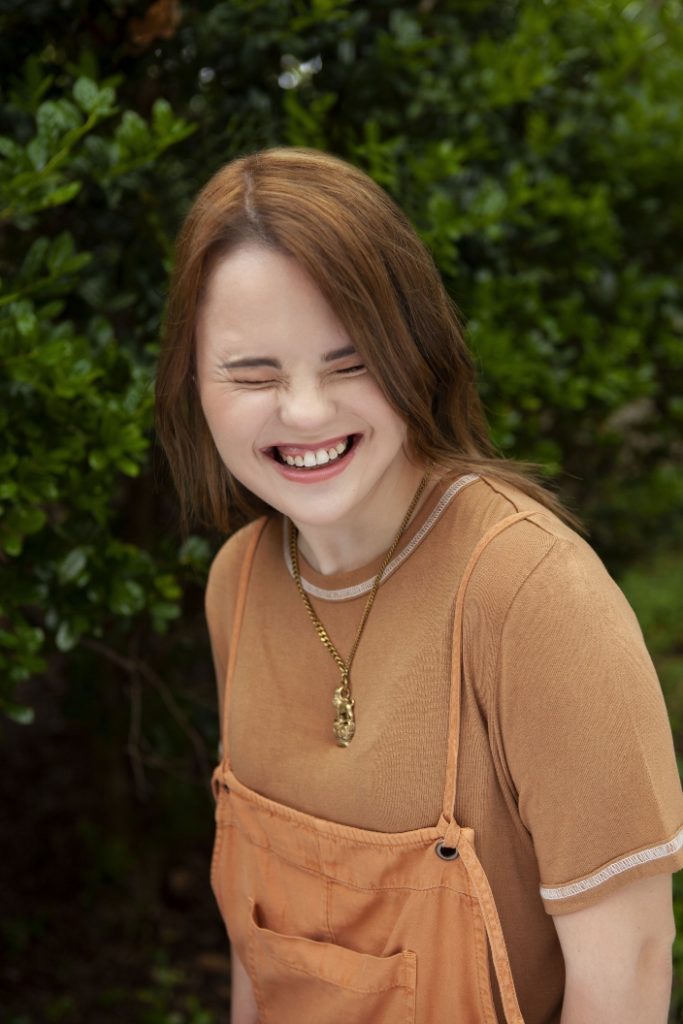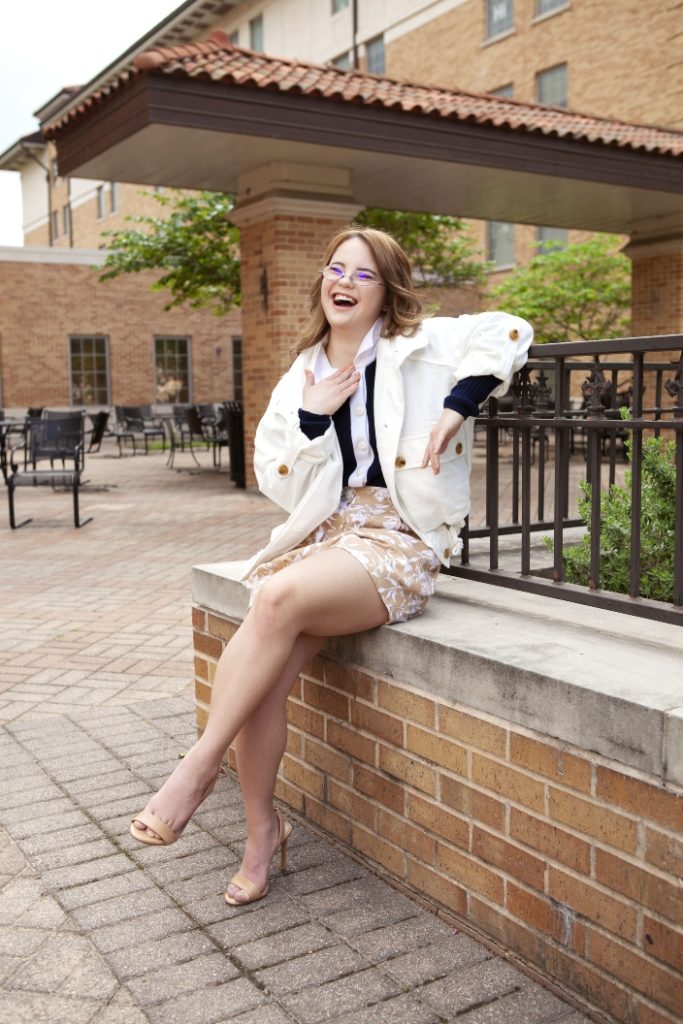Special Olympics Ambassador Sydney Weigand lives without inhibition.
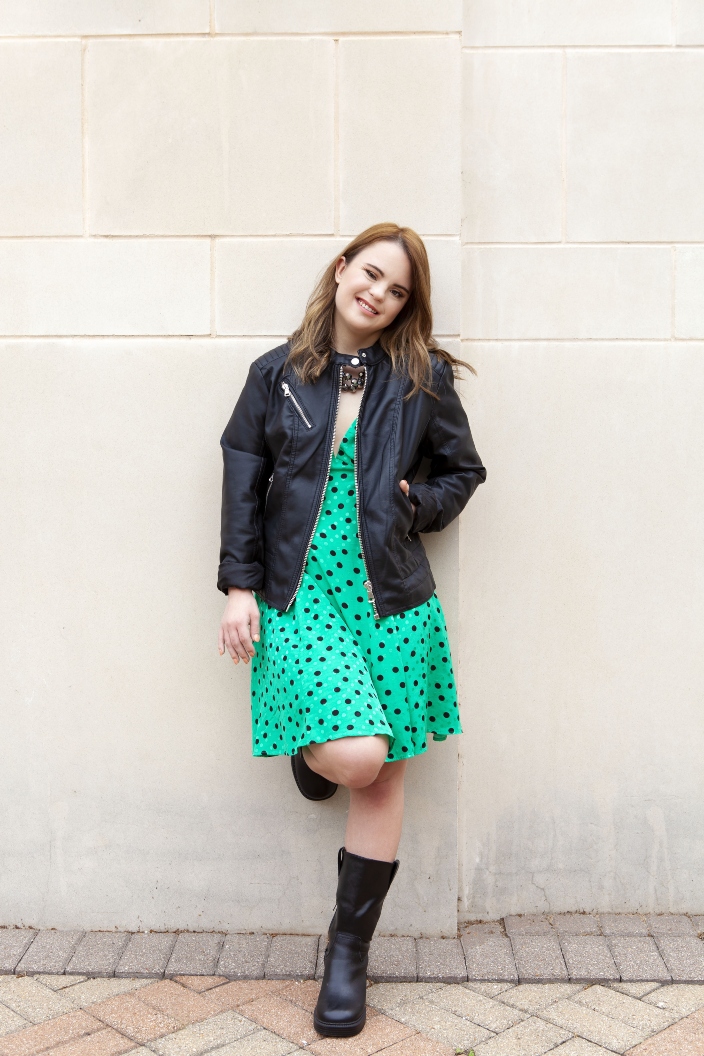
By Jenny Hoff, Photos by Rudy Arocha, with assistance from Marshall Walker, Styling by Parke Ballantine with inspiration from Nordstrom, Hair and makeup by Alicia Beller
Sydney Weigand has a superpower. She can detect a person’s pain or joy from across a crowded room. In fact, she’ll cross that room to give the person in need a hug, even if she’s never met them in her life.
“She doesn’t worry about it if someone is going to laugh at her, she has no inhibitions,” says her older brother, 28-year-old Colby Weigand, who works in film production. “She just does what she thinks she needs to do.”
Colby recounts a recent experience at their church in North Austin when Sydney noticed a woman sitting on a bench outside, looking sad. “She said, ‘I think that person needs a hug,’ and went straight to her. You could see how grateful the lady was, just to have received this kindness. That’s the effect Sydney has on a lot of people.”
Her father, Michael Weigand, says empathy has been a gift Sydney’s possessed since childhood. “Even when she was little, she would always go up to someone and say something good,” he recalls. “She would walk away, and they would stand taller, feeling better.”
When Sydney was born 24 years ago, few people spoke about the special abilities a child with Down syndrome could possess, how incredibly full lives they could lead when given the chance to flourish. For most parents, a Down syndrome diagnosis means a lifetime of caretaking and a fear of how strangers will treat their child.
“When doctors diagnosed her with Down syndrome at 4 days old, we were devastated,” recounts her mother, Delanie Weigand. “We didn’t know better. We had always envisioned having this brown-haired, ponytailed athletic daughter, and suddenly we thought that couldn’t be her future. But she has exceeded every expectation we ever had and more.”
Sydney has not only won more than 200 medals in various Special Olympics sports competitions, but she is also a certified global messenger, a certified health messenger and athlete leader for Special Olympics Texas. She has given speeches about the benefits of the organization in front of governors, senators, NFL players, the Kennedy-Shriver family and more. A huge fan of musical theater (her current favorite is Hamilton), Sydney has even more ambitions for the future.
“I want to be an actress or singer,” says Sydney. “I like music and dancing.”
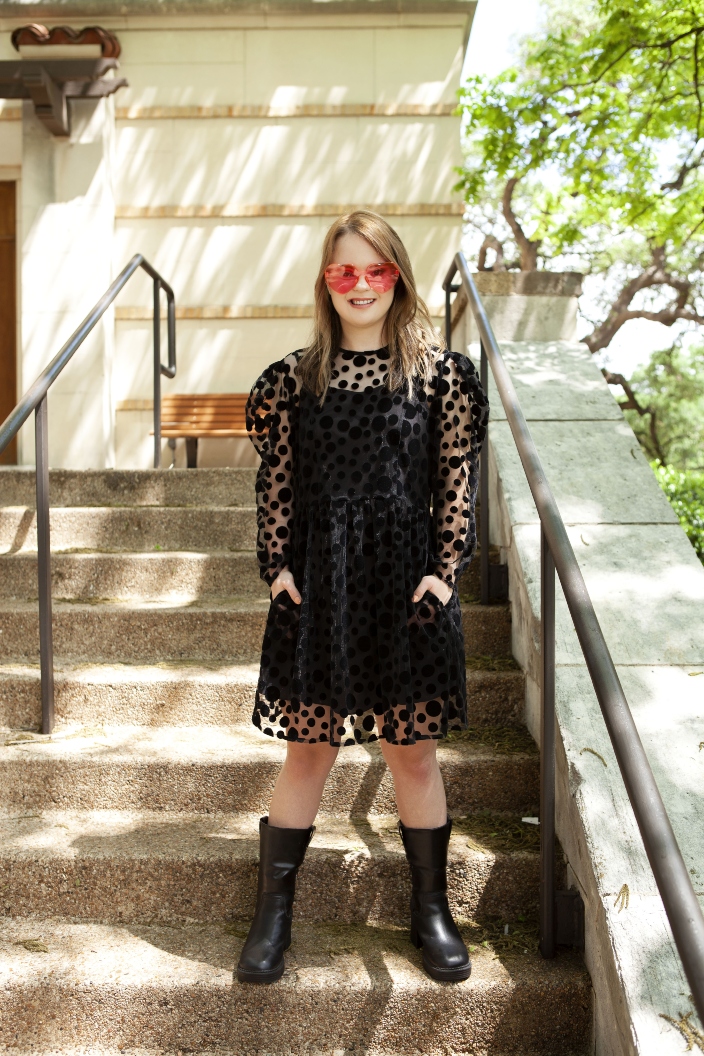
And why not? She’s already had roles in national commercials, acted in plays, has an agent in California and has now graced the cover of a magazine. These aren’t her parents’ initiatives; these are Sydney’s dreams she accomplishes every day.
“She will achieve what you set out for her to do,” says Delanie. “A lot of people underestimate her. Our goal is to make sure she is not underestimated.”
Sydney Weigand’s bedroom is a perfect snapshot of the young woman she has become, in no small part due to her parents’ determination to make sure she could realize all her talents and skills. Hundreds of gold and silver medals hang from her window, celebrating her tenacity to compete in swimming, powerlifting, tennis, basketball, gymnastics, bowling and track and field. Pictures of the Jonas Brothers and Niall Horan from One Direction adorn her closet, personally signed and dedicated to Sydney. A colorful bedspread covers her bed, and the words “Live as though heaven is on earth, dance as though no one is watching, sing as though no one can hear you, love as though you’ve never been hurt” accent the walls.
“Those words are Sydney,” says Delanie, as she looks around the room with a smile on her face. “That’s the way she lives her life.”
But perhaps the most “Sydney” part of her room is the poster board filled with photos of her bright smiling face, arms wrapped around her brothers, her parents, her friends, fellow athletes. It’s a menagerie of a life filled with beautiful moments and experiences: acting in a school play, dribbling a basketball, competing in a swim meet, shaking hands with her favorite celebrities, speaking at a conference full of politicians.
“We always say Sydney’s never met a stranger,” says Michael, as Sydney takes his hand tenderly into her own. “Even at a hockey game, the bartenders know her by name and will make her a Shirley Temple, which they normally don’t serve, but they will for Sydney. When they see her, they light up.”
Just 60 years ago, Sydney’s life could have been very different, as children born with her special needs were often discriminated against and even housed in “inhumane institutions, where they were deprived of education, healthcare and even plumbing,” according to the Global Down Syndrome Foundation. It wasn’t until the Special Olympics started gaining steam and integrating children of all abilities did public perception start to change.
In the early 1960s, Eunice Kennedy Shriver started that movement when she founded Camp Shriver, with 36 children and 24 counselors—students recruited from high schools and colleges—to give kids with intellectual disabilities a chance to participate in summer camp. Established camps wouldn’t accept special needs kids for fear they would be “unteachable” and “belligerent,” but Camp Shriver proved otherwise. It turned out kids with disabilities had the same desires as any other child: to have fun, interact and play with each other.
Today, the Special Olympics supports over 5 million athletes worldwide. With 1 million coaches and volunteers, the organization puts on more than 100,000 competitions each year, including 32 Olympic-type sports through programs in more than 170 countries. The organization not only provides athletic opportunities for people, but is a main source of social interaction and one of the biggest providers of health care services to special needs athletes.
A huge part of the organization’s success in changing the quality of life for athletes is its Unified Champion Schools program, which works with schools across the country to create integrated training programs for athletes of all abilities. This is accomplished by bringing together students with and without intellectual disabilities to create accepting school environments, utilizing three interconnected components: Special Olympics Unified Sports, inclusive youth leadership and whole school engagement. It gives kids with and without disabilities a chance to interact in a fun way and create lasting friendships that change all kids’ lives for the better. It’s the kind of program Sydney got to participate in as a student in Round Rock ISD.
“What I have found is, especially in sport, their participation and their attitude while they are competing is really pure,” says Jan Sartain, Sydney’s longtime coach who has known her since she was just 3 years old. “They are there for the pure joy and excitement of competing, of giving their best and doing their best.”
Sartain is the former lead teacher for the adaptive physical education program and Special Olympics coordinator for Round Rock ISD. Though she has coached hundreds of students throughout her career, Sydney sticks out to her as someone strong and determined to give whatever it takes.
“When she comes, she’s committed to practice, she’s committed to put the work in, she has a great attitude. You know you can always depend on her.”
It’s that determination that earned Sydney a spot as a representative of Texas at the Special Olympics USA Games in Seattle in 2018. With 7,000 other athletes over a period of four days, Sydney took the national stage and showed what she was made of.
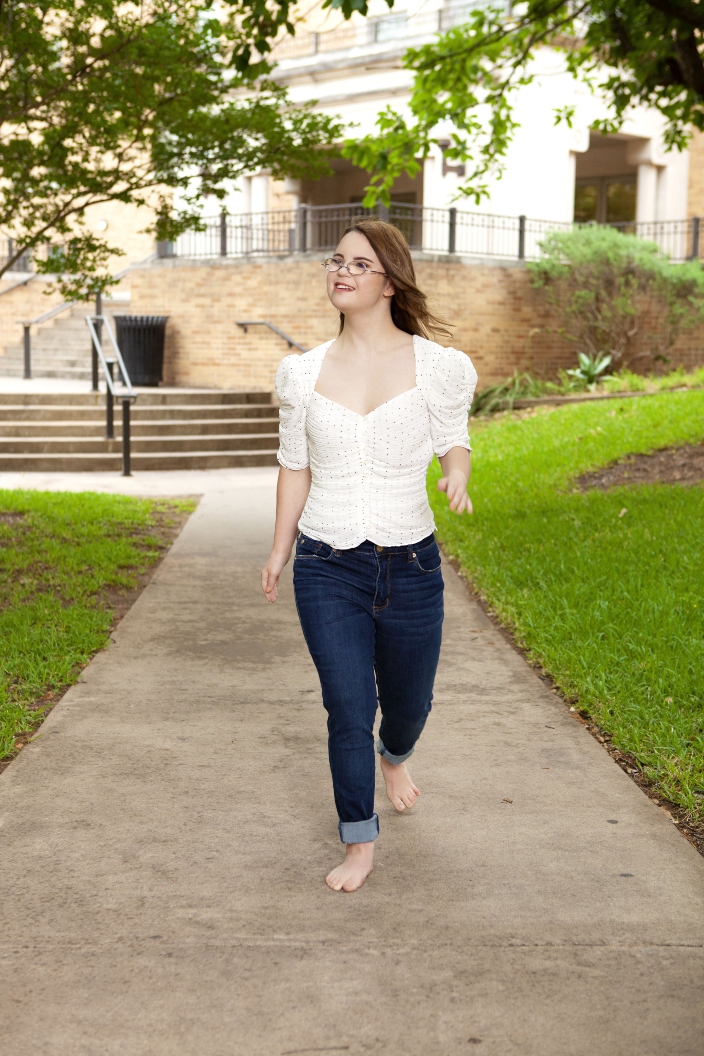
“She also won a date with the Jonas Brothers,” laughs her mom. “She was the top fundraiser for the games and got a chance to meet them that morning, go to their concert that evening and then waltz past the VIP line for a meet-and-greet afterward. She’s taken us to some pretty amazing places.”
Sydney is passionate about health, and as a health ambassador for the Special Olympics, she recently created a video with Colby on good eating habits and how to shop smart at the supermarket. “There are definitely times where with certain lines she can struggle a little, but that’s the same for every actor,” he says. “We have big actors who struggle with certain lines. She did great.”
While Sydney currently has a job in administration at the U.S. Money Reserve, she’s an entertainer at heart. Just take a look at her Instagram and TikTok feeds and you’ll see Sydney singing into a microphone at a packed stadium or singing in her car, reciting every word to her favorite songs.
“She’s done a lot of things because she says yes to things that come her way,” Michael says. “I think that’s a lesson she’s taught all of us.”
The Importance of Connection
Much like most of our social media feeds, Sydney’s doesn’t show the loneliness and toll the COVID-19 pandemic took on her as she was suddenly isolated from her friends and community when the world shut down. Though she had her family, who would take her to empty movie theaters just for an outing during the pandemic months, she was unable to see all the friends she connected with regularly during the Special Olympic games. The burden that isolation had on the special needs community was especially severe, given there were few other independent outlets for them to connect with friends.
For two years, she was separated from her boyfriend, Brennan—who lives in Dallas and is also a Special Olympics athlete—her best friend Hayley, as well as the activities that make up her life. Because Sydney feels so deeply, she also felt the pain others around her were experiencing, and her family was careful to limit exposure to sad news going on around the country and world.
“The pandemic was really difficult,” says Michael. “She didn’t like to see people sick or be alone. There were no Special Olympics, no real activities.”
“It was very sad,” echoes Sydney, her usual smile fading.
In February of this year, Sydney finally got a chance to reunite with her friends for the first time in two years and compete once again in the Special Olympics Texas Winter Games, which were held in Bee Cave—a small city just west of Austin. She was thrilled to show off her muscles in powerlifting (she can bench press 75 pounds; her deadlift max is 145 pounds), where she won yet another gold medal to add to her wall.
“I feel happy,” she says, recognizing her medal achievement. “They look cool there.”
All people need connection and a sense of purpose; that holds equally true for those with intellectual disabilities. It’s crucial for good health, both physical and mental. It was only in 1975 when the federal government passed a law ensuring all children, regardless of ability level, have access to free education. Since then, the number of children born with Down syndrome who go on to live full lives with friends, jobs and sometimes even independent homes, has steadily increased. Being a part of the Special Olympics increases the chances immensely of a longer, healthier and more fulfilling life. But there is still work to do.
“It is an ongoing charge for everyone: for families, for the education system, for the business world to continue to open their eyes and open their arms to look at every individual for who they are,” says Sartain. “Every person has something they can contribute to this world.”
Sydney’s not necessarily out to be a role model, but she is becoming one through her continuous engagement in educating the public about the importance of organizations like the Special Olympics and through using social media to showcase her life—just like any budding influencer. The feedback she gets is almost always positive and encouraging.
“I feel good about our future, the way the young people treat each other,” says Delanie. “I think it’s come a long way since I was growing up. You walk away feeling the world is a good place.”
Not a Pushover
One of Delanie’s earliest memories of Sydney’s diagnosis was a nurse telling her Sydney’s condition would ensure “she wouldn’t have an aggressive bone in her body.” What was meant as encouragement sounded like a curse to Delanie, who feared her daughter wouldn’t be able to stand up for herself against a potentially cruel world. Two days later, when they tried to give her feeding tubes, Delanie says she watched baby Sydney fight back with all her might—and her proud mama heart soared.
“Women used to be told they couldn’t run marathons because they’re too dainty,” says Delanie, with a wry smile. “It’s the same thing. She is more capable than they realize.”
Growing up with two brothers—older brother Colby and younger brother Jaden, 21, who is a student at Texas Tech—Sydney knows how to stand up for herself. “I remembered when we were 10 and 12 years old, wrestling on her bed in her room. I was a decent size, and she flings me across the room,” laughs Jaden. “She’s a lot stronger than you think. That’s the moral of the story.”
When asked what he thinks Sydney could do in the future, he responds, “I feel like she’ll say yes to anything that comes up; she’ll do it and enjoy it. I can see her continuing in the Special Olympics and becoming an ambassador and advocate for it. Inspiring other kids to do things that she’s done. I can see her getting into acting if the opportunities come up. I think the better question would be to say what couldn’t she do in her future?”
Sydney’s current interest is learning how to drive and living on her own again (as she did when she attended the University of Texas). Her boyfriend is interested in getting married. But that would likely require her to move to the Dallas region, away from her close-knit family.
“I think people have a tendency to be very focused on material things and monetary things, but the definition of what a good day is and what a happy life looks like isn’t centered on how much money you have,” says Michael. “She’s probably never going to be an attorney or neurosurgeon, but she’s going to have a big impact on the people around her.”
For now, Sydney seems to be using her superpowers to inspire those around her to be more open, to take more chances and to spread more love. Her willingness to try anything, to dance when she feels the urge, to hug a stranger or friend when they need it, to compliment spontaneously with no expectation in return, to feel and express joy every day, is creating more impact than she could imagine.
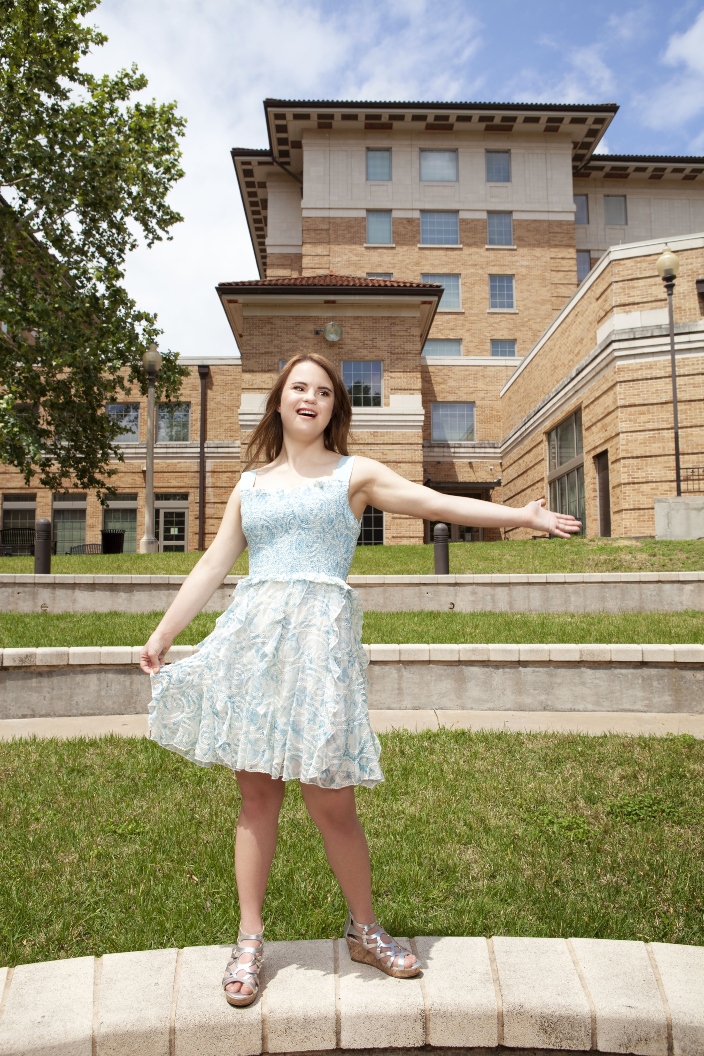
“She lives her life the way she wants to live,” says Colby. “She’s done more in her life than I think any of us have. She inspires me to get up and do one small thing, and that small thing can lead to a lot of other things in your day. She embodies that in her life, to always keep moving and keep trying without inhibition.”



